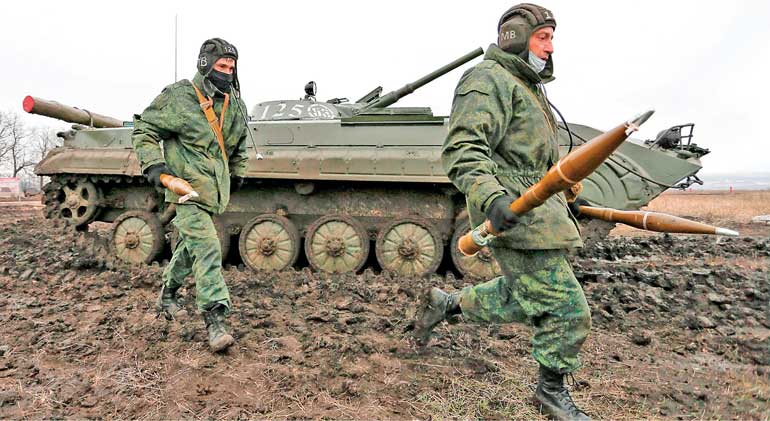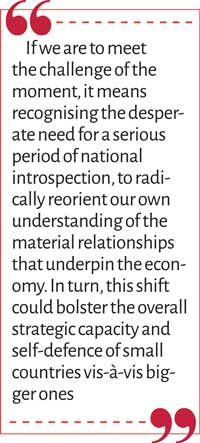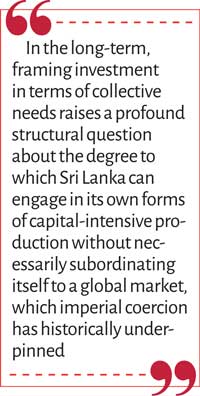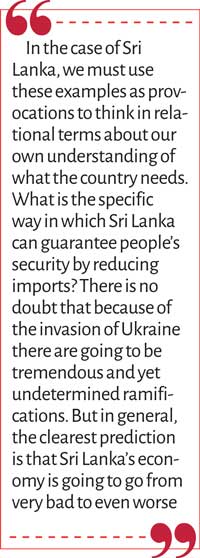Friday Feb 20, 2026
Friday Feb 20, 2026
Monday, 28 February 2022 00:00 - - {{hitsCtrl.values.hits}}

In a time of great upheaval, every choice becomes consequential
Russian missiles are ripping into apartment blocks in Ukraine. The world watches in horror. This is a time of growing potential for upheaval for those previously furthest removed from conflict. People in Western countries are beginning to think about what the consequences of renewed global conflict could mean in terms of ever more spheres of daily life. First it starts with the gas pump. Does it end with military conscription and mass mobilisation? The last leg of global stability seems to have broken. There is a dawning awareness that the bottom is falling out and there is little clue as to how and when it will end.
Western countries are beginning to think about what the consequences of renewed global conflict could mean in terms of ever more spheres of daily life. First it starts with the gas pump. Does it end with military conscription and mass mobilisation? The last leg of global stability seems to have broken. There is a dawning awareness that the bottom is falling out and there is little clue as to how and when it will end.
But for those living in the global periphery, the invasion is a bitter vindication of their perspective. Nazi aggression, to paraphrase Aimé Césaire, was the logic of colonialism applied to Europe. For those who have observed destruction far and wide—and even within the narrow swathe of the Middle East, from Yemen to Palestine—it is far from incomprehensible. Still, the dramatic consequences of war in Europe imply an existential transformation for the global system. It is perhaps why even those who have lived in countries that have experienced decades of conflict can still sympathise with Ukraine and watch in shock as the centre crumbles from within.
In a time of great upheaval, every choice becomes consequential. But there is also a great amount of thinking that must go into even the simplest slogan. When the Bolsheviks popularised the slogan of “Peace! Land! Bread!”, they were watching their country undergo the mass slaughter of World War I. Yet even “peace” had to be thought concretely in terms of what it would mean for Russia to surrender territory to Germany at Brest-Litovsk, to end their participation in World War I. The irony today is that it is Russia that is trying to subject other people to renewed domination. But its own historical experience—the same kind for which Putin now criticises Lenin—offers lessons for staying intellectually agile during a period of severe political stress.
Democratic autonomy
If we must break with Lenin, it is on the assumption of a final endpoint. The reality is that there will not necessarily be a great pitched battle in which the working class will triumphantly defeat its capitalist oppressor, thereby creating permanent global peace. Instead, for the foreseeable future, the world is composed of states that working people must hold accountable within their respective countries, to ensure the possibility of peaceful coexistence. In general, the more abstract the maxim, the more difficult it becomes to apply in concrete situations. But if the collapse induced by the Russian invasion leads to anything, it must be a fundamental reckoning with the principles on which the previous global order was based.
oppressor, thereby creating permanent global peace. Instead, for the foreseeable future, the world is composed of states that working people must hold accountable within their respective countries, to ensure the possibility of peaceful coexistence. In general, the more abstract the maxim, the more difficult it becomes to apply in concrete situations. But if the collapse induced by the Russian invasion leads to anything, it must be a fundamental reckoning with the principles on which the previous global order was based.
Let’s be clear: there should be no question of returning to the Western liberal humanitarian interventionism of the post-Cold War order. But neither should we accept the domination of smaller states by bigger states; an insidious and deceptive way of framing multipolar order, in which regional blocs divide countries up among themselves. Instead, the challenge, as always, is engaging with the paradox of politics to think together two principles that are at times in tension with each other: to put it simply, the need for democratic autonomy. When we think about autonomy, we think about the right of each state to determine its own affairs, free from the domination of more powerful actors. But when we think of the democratic character of this autonomy, we recognise that a state is only legitimate to the extent that people have control over the institutions that govern them.
Accordingly, we need a language to oppose the Russian invasion of Ukraine, while simultaneously recognising the degree to which Russia was able to capitalise on the West’s hypocrisy in imposing “regime change” in other countries, notably Afghanistan, Iraq, and Libya. We also need a way of critiquing those states that suppress their own populations in the name of pseudo anti-imperialism, state sovereignty, or whatever other hyper-nationalist justifications they use. Ultimately, however, even solidarity will be a fairy tale unless we recognise that an internationalist perspective only has practical relevance if it is realised through a concrete class project that begins from a national perspective and broadens to encompass the entire global order.
broadens to encompass the entire global order.
Transforming countries from within
The West is already starting to wake up to this need. People in Western countries are beginning to recognise that their own systems created the vulnerabilities that Putin exploits. For example, Germany’s excessive emphasis on “balancing the budget” meant foregoing the investments that would have enabled it rapidly decarbonise its economy and make it less vulnerable to oil and gas dependence on Russia. This realisation must further lead to the demand that Germany, as part of the European Union (EU), atone for imposing extreme austerity on other countries, such as Greece. Similarly, others, such as the US economists Dean Baker and JW Mason, have endorsed free bus service as a solution to the oil crisis, by further reducing dependence on cars. All these examples are useful. They are also being articulated with the necessary revision of the narrative that the post-Cold War order was predicated on US benevolence.
In the case of Sri Lanka, we must use these examples as provocations to think in relational terms about our own understanding of what the country needs. What is the specific way in which Sri Lanka can guarantee people’s security by reducing imports? There is no doubt that because of the invasion of Ukraine there are going to be tremendous and yet undetermined ramifications. But in general, the clearest prediction is that Sri Lanka’s economy is going to go from very bad to even worse. Oil alone, for example, has jumped from around $ 25 in the middle of 2020, to over $ 100 since the start of Russia’s invasion. This deterioration will accelerate the country’s polarisation and make it impossible to avoid a clear resolution of the crisis in one direction or another. What would a progressive solution to the crisis in Sri Lanka look like?
When people criticise the very concept of import restrictions, for example, they typically assume a specific model of the economy that presupposes the intensification of capital by integrating into bigger markets that extend far beyond the national territory. But the way in which we debate investment matters. To be self-sustaining, it must reflect the collective priorities of the people living in the country. If the drawbridges of free exchange in the global economy are being raised, and Sri Lanka is forced to depend on its own resources, then the question becomes, how must the country’s economy be reorganised in a fundamental way? Simply put, by reducing imports we must also consider what are the changes in the relationship between production and consumption that this process would require.
Reframing the economy
Take food. If people are facing the prospect of shortages, if not outright famine, then, as Ahilan Kadirgamar has put forward, why not create a public distribution system to guarantee that they have enough to eat, like the food subsidy created during World War II? To do this would require ramping up domestic production, which demands public investment. But even food is only the most immediate need. There are other less pressing but no less important needs. What about oil? If we think about it as a proxy for energy consumption, it’s clear Sri Lanka must experiment with changes in the design of its built environment to promote more effective solutions. Why is there an excessive focus on Colombo? Ban luxury high-rise development and socialise the construction of housing, to provide living spaces more conducive to public satisfaction. What about pharmaceuticals? If we think about all the factors that determine people’s health, it’s clear that chronic stress and anxiety have a significant impact on their livelihoods. Why not replace industries that rely on wage repression and the intensification of work, with those that provide a sustainable livelihood in a far more holistic sense?
need. There are other less pressing but no less important needs. What about oil? If we think about it as a proxy for energy consumption, it’s clear Sri Lanka must experiment with changes in the design of its built environment to promote more effective solutions. Why is there an excessive focus on Colombo? Ban luxury high-rise development and socialise the construction of housing, to provide living spaces more conducive to public satisfaction. What about pharmaceuticals? If we think about all the factors that determine people’s health, it’s clear that chronic stress and anxiety have a significant impact on their livelihoods. Why not replace industries that rely on wage repression and the intensification of work, with those that provide a sustainable livelihood in a far more holistic sense?
Of course, the latter issue gets to the core of the matter. If we talk about changing the incentives of production, the question becomes, which capitalists will invest if profit margins are tight? But this area again is where we must think not simply in terms of state ownership, but production oriented toward people’s needs in a much broader, collective sense. If the state, for example, were to provide financial and technical support to a network of inter-linked industries organised into cooperatives, then perhaps new opportunities for accumulation would emerge. For example, as has been raised in economic discussions in the country, there is a possibility to develop Sri Lanka’s comparative advantage in a substantial industry such as boatbuilding. This opportunity exists because it developed out of the social life of the fishing community.
In the long-term, framing investment in terms of collective needs raises a profound structural question about the degree to which Sri Lanka can engage in its own forms of capital-intensive production without necessarily subordinating itself to a global market, which imperial coercion has historically underpinned. People have often used the example of high-profile investment goods, from steam engines to semiconductors, to think about what it means for a country to develop in concrete terms. Yet the change in the forces of production implied by a transformation of the relations of production is not predetermined. There are limitless possibilities. Over an extended period of decades, new forms of knowledge could emerge that contain a range of practical applications, which could manifest in specific commodities that we can hardly anticipate.
Sustaining hope
To even contemplate the broad outline of these possibilities, however, requires navigating the overwhelming current crisis in which the most pressing needs must be met. The breakdown of the global order is the latest expression of the limits of our previous imagination. It threatens to expose a massive void. But it is also a necessary moment to reconceive everything that we traditionally took for granted in our most basic assumptions about the way in which the world works. Accordingly, if we are to meet the challenge of the moment, it means recognising the desperate need for a serious period of national introspection, to radically reorient our own understanding of the material relationships that underpin the economy. In turn, this shift could bolster the overall strategic capacity and self-defence of small countries vis-à-vis bigger ones.
In the South Asian region, Sri Lanka, of course, is within India’s “security perimeter.” There is no doubt too that India will be caught up in the crosscurrents of geopolitical polarisation, between the US, EU, Russia, and China. But if Sri Lanka can navigate out of the current crisis by radically reorienting its economy, it could yet become a beacon for the rest of the region. Like our forebears who led the fight for free education and healthcare, it could crystallise demands for change in other places by providing an alternative paradigm of democratic autonomy.
On this basis, we may be able to orient ourselves amid a global order that is unravelling. It is a hope that might sustain us during this dark period, by offering a vision of what could be on the other side. Meanwhile, for a world on the edge of conflict, the elaboration of a class project to hold our own national elites accountable, while working toward international links, is the only method that will ultimately circumscribe the most extreme forms of violence. The latter once again threaten to overwhelm our world, and possibly extinguish humanity itself.